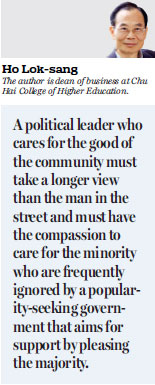Polls show what people want - not what they need
Updated: 2017-03-21 06:53
By Ho Lok-sang(HK Edition)
|
|||||||
Ho Lok-sang argues that surveys gauging people's desires are good guides for policymakers but should not become tools for implementing policy
Chief Executive candidate Carrie Lam Cheng Yuet-ngor shocked most observers when she said at a public debate that, because she "trusted Hong Kong people", in the event that the mainstream view in the city was against her, she would resign.
She later clarified that the mainstream view she referred to was not her popularity rating in polls. What she meant was that if she came to a point where she could not discharge the constitutional duties as a Chief Executive was expected to do under the Basic Law, because the mainstream view was against it, she would resign.
Since these days so many different parties conduct opinion polls in Hong Kong, a good question is: Are these opinion polls any use? Do opinion polls inform policymakers so they can simply follow what the polls tell them to do? Do opinion polls tell us what the better policy is, who is the better CE, and what the policy priority should be?

As a policy analyst, I take opinion polls seriously but only to know what people desire and what they worry about. Opinion polls cannot tell us how the government can address these wants, desires, or worries. Thus if there are four policy options on the table, the most popular option need not be the best policy option. An example can be drawn from the recent decision for Britain to leave the European Union. It is perfectly appropriate to conduct a survey to collect information on people's concerns and worries. Having done that, then the government should work to seek the best strategy to deal with those concerns and worries.
Policy is a complicated matter and needs calm and careful analysis with needed data and other information. Public opinion is much simpler, often reflecting emotions, personal biases, personal interests, social circle and the kind of information or misinformation that each respondent may access. Thus, someone who is able to elicit the most popular votes is popular but need not be a good CE. A policy option that gets the most support is popular, and again need not be the best policy.
I regard polls as similar to the market surveys firms conduct to know their customers' needs. After finding out what customers want, the firm's designers and engineers can then design and test a product, which will then be tested in the market. You would not conduct a market survey to tell you how to design a product. Thus an opinion poll is often useful in guiding policy makers' priorities and informing them of citizens' top concerns but to defer policymaking to an opinion poll is an abrogation of duty.
Actually, an important task of a leader is to bring minds together, and this task is more necessary when people oppose the leader. When people are against a leader, it is of course possible that the leader is bad but it is also possible that they have it all wrong. The leader needs to reexamine the arsenal of policies; if nothing is wrong, the leader and team will still need to explain to the public and attempt to win their hearts.
One of the qualities a political leader needs is the willingness to make difficult and even unpopular decisions for the greater good. How does he or she know this is for the greater good? That requires judgment. This judgment again must be based on information and understanding. How could an unpopular decision be for the greater good? This is because most people have their eyes on their short-term interest. A political leader who cares for the good of the community must take a longer view than the man in the street and must have the compassion to care for the minority who are frequently ignored by a popularity-seeking government that aims for support by pleasing the majority. A good political leader should be ready to stand up and say what needs to be said - rather than just tell the public what it wants to hear.
Unfortunately, good political leaders who fail to please voters may not even win in a popular election and this is a pitfall of electoral democracy. In a sense, the popular vote is like polls, often reflecting emotions, biases and voters' short-term interests and concerns, more than reflecting an understanding about the needs and long-term interests of a society. As Hong Kong marches toward a higher and higher degree of democracy, these limitations of the vote and public opinion polls need to be understood.
Hong Kong will know who will be our next CE in less than a week's time. Let us remember that opinion polls do reflect peoples' concerns and need to be taken seriously. But opinion polls do not tell us directly what needs to be done, or who is the best CE. Members of the Election Committee should cast their votes in good conscience with their eyes on the long-term good of Hong Kong.
(HK Edition 03/21/2017 page7)